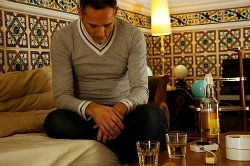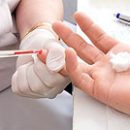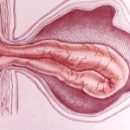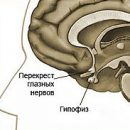In a word, you can cure a person, and you can kill. Careless word, look, gesture of the doctor - and the patient fading in front of her believes, which is incurably sick. This effect is called psychogenic yatrogen and is quite common. Read more about him in the article.
Content
Psycho-meroen (Greek. IATROS doctor + Gennao create, produce) - psyche disorders arising as a result of medical workers' errors - incorrect, careless statements or actions.
Health disorders arising from the impact on the patient of the words and actions of the doctor were already known to doctors of antiquity. However, the term «Natrogenation» Received widespread only after the publication in 1925. work of the German psychiatrist Buma «Doctor as the cause of mental disorders». Since that time, the concept of iatrogenation is actively investigated by specialists from different directions. There is a steady tendency of the expansion interpretation of yatrogenic diseases. Many specialists, especially abroad, include violations that arise as a result of not only careless words, but also any actions of the doctor (from complications of the wrong manipulation or procedure before the occurrence of the so-called drug case),.E. Any negative effects of medical intervention.
How psychogenic doctrine develops
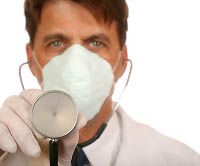 For the development of psychogenic doctors, both the behavior of the doctor and the peculiarities of the patient (degree of emotionality, imperitant, etc.). Many of the sick people suffer not only from illness, but also from anxiety generated by it, fears, fears for the outcome. This explains the special attention of the patient and the words of the doctor, and its behavior, intonation, facial expression. At the same time, depending on the type of nervous activity and peculiarities of the psyche, different patients are different, sometimes the opposite, react to certain words and behavior of the health worker. Fatal meaning may not have not only ill-conceived replicas («Your heart attack is the first call»; «... The main vessel of the heart misses blood by 30%» and T.NS.) or the incomprehensible meaning of some words and expressions («Hook-shaped stomach», «Myocardial dystrophy» and T.D.), but sometimes even interjections or a prolonged doctor's silence, which can be interpreted by patients as signs of particular difficulty of diagnosing or treating his illness, its particular heavyness, hopelessness of the forecast.
For the development of psychogenic doctors, both the behavior of the doctor and the peculiarities of the patient (degree of emotionality, imperitant, etc.). Many of the sick people suffer not only from illness, but also from anxiety generated by it, fears, fears for the outcome. This explains the special attention of the patient and the words of the doctor, and its behavior, intonation, facial expression. At the same time, depending on the type of nervous activity and peculiarities of the psyche, different patients are different, sometimes the opposite, react to certain words and behavior of the health worker. Fatal meaning may not have not only ill-conceived replicas («Your heart attack is the first call»; «... The main vessel of the heart misses blood by 30%» and T.NS.) or the incomprehensible meaning of some words and expressions («Hook-shaped stomach», «Myocardial dystrophy» and T.D.), but sometimes even interjections or a prolonged doctor's silence, which can be interpreted by patients as signs of particular difficulty of diagnosing or treating his illness, its particular heavyness, hopelessness of the forecast.
The risk of psychogenic iatrogenation will be the risk of equal terms of unequal treatment of different ages, gender, education. In women, the probability of iatrogenia is on average higher than in men. The age groups of increased risk of rationroaction development are people of the so-called transitional ages - adolescents and persons in the period of Clemaks, as well as the facial age, among which they have a lot accentuted on the inevitability of the senior changes and the increased probability of death of the emerging disease.
To factors that can contribute to the emergence of non-heroed diseases should also be attributed and not always justified expansion of medical information distributed among the population (popular lectures, telecasts and radio broadcasts) when the symptoms of one or another dangerous disease are set out, attention is recorded on its early manifestations, drawn frightening perspectives «Late Appeal».
How psychogenic hatching is manifested
Non-neurogenic diseases are manifested mainly by non-neurotic reactions in the form of phobias - an irresistible fear (carcherophobia - fear of oncological diseases, cardiophobia - fear of cardiological diseases) and various versions of nervous disorders. Their development contributes increased emotionality and suggestibility. Depending on the nature of the yatrogenation and type of personality, the nervous disorders may be expressed by the preemptive impairment of the functions of cardiovascular (heart arrhythmia, blood pressure changes, etc.), digestive (heartburn, vomiting, chair disorders) or other systems in combination with depression, fears and t.NS.
Treatment and prevention of psychogenic dortogenies
Treatment of nuclear diseases coincides with the treatment of neurosis. The main method is psychotherapy, supplemented by drug treatment, depending on the nature of the manifestations of nerve disorders. Preferably, the treatment conducts a psychotherapist or psychiatrist. Unacceptable to inform the patient that there is no illness and it is not necessary to be treated. Doctors must remember that this is a disease that requires a thorough study of the characteristics of the patient's personality, knowledge of its social environment. Psychotherapy requires the establishment of the characteristics of this nuclear disease and factors that contributed to its occurrence. A large psychotherapeutic effect can be achieved by a convincing conclusion of an authoritative consultation or a highly qualified specialist communicated to the patient.
The forecast of psychogenic yatrogenies in most cases is favorable, with timely and proper treatment, recovery occurs in a few weeks or months. Later recognition of the nuclear disease contributes to the protracted flow and worsens the forecast.
The number of psychogenic yatrogenies is steadily growing. Against this background, the responsibility of doctors for their words, the need for constant control of their behavior (intonations, views, gestures), which may be incorrectly interpreted by the patient. In modern conditions, when with patients, as a rule, do not communicate not alone, but several doctors, as well as medium and younger health workers, the possibility of a non-heroed disease increases. Thoughtful should be the content of the issued patient of medical records. Special caution should be shown when assisting health workers who have a non-volatory disease regarding frequent, and their treatment is difficulties in connection with often increased resistance to health workers to psychotherapy.



